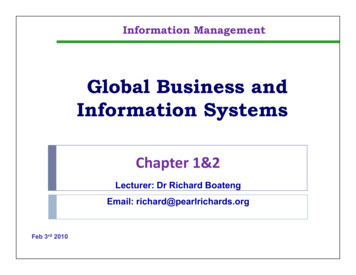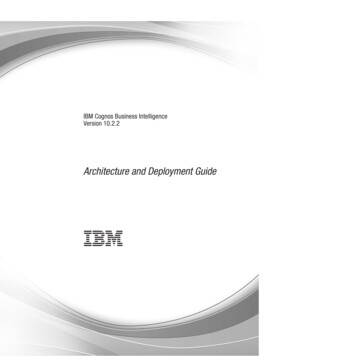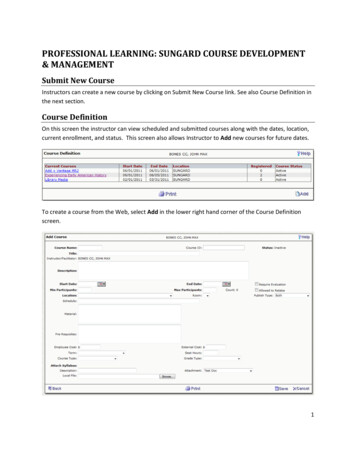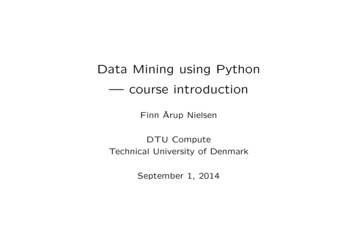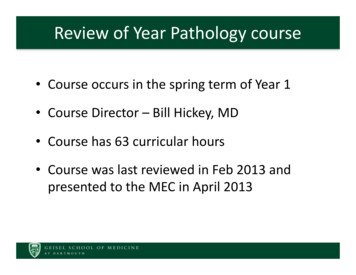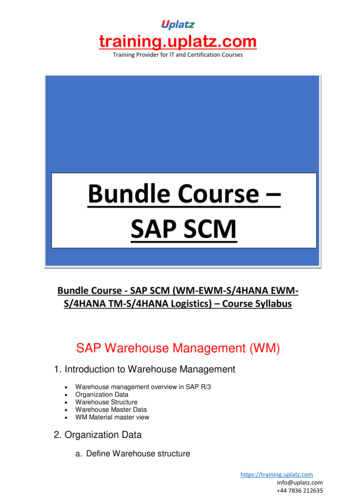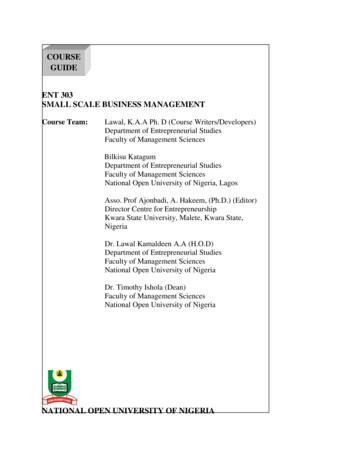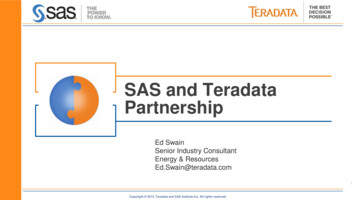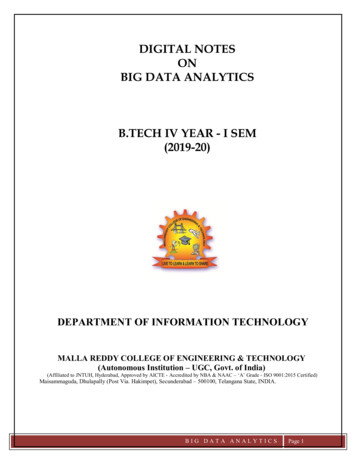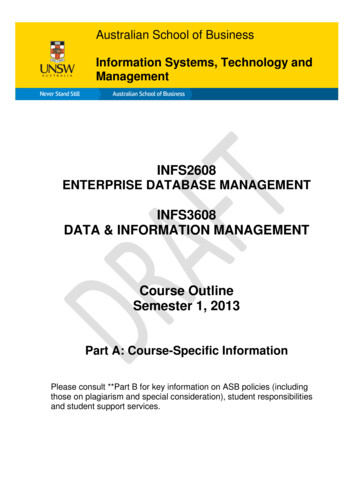
Transcription
Australian School of BusinessInformation Systems, Technology andManagementINFS2608ENTERPRISE DATABASE MANAGEMENTINFS3608DATA & INFORMATION MANAGEMENTCourse OutlineSemester 1, 2013Part A: Course-Specific InformationPlease consult **Part B for key information on ASB policies (includingthose on plagiarism and special consideration), student responsibilitiesand student support services.
Table of ContentsPART A: COURSE-SPECIFIC INFORMATION31STAFF CONTACT DETAILS32COURSE DETAILS32.12.22.32.42.5Teaching Times and LocationsUnits of CreditSummary of CourseCourse Aims and Relationship to Other CoursesStudent Learning Outcomes333443LEARNING AND TEACHING ACTIVITIES63.13.23.33.4Approach to Learning and Teaching in the CourseLearning Activities and Teaching StrategiesForming a GroupPeer Evaluation66774ASSESSMENT74.14.24.34.4Formal RequirementsAssessment DetailsAssessment Format and Assignment Submission ProcedureLate Submission of Assignments78995COURSE RESOURCES106COURSE EVALUATION AND DEVELOPMENT107COURSE SCHEDULE11INFS2608 – Enterprise Database ManagementINFS3608 – Data & Information Management2
PART A: COURSE-SPECIFIC INFORMATION1 STAFF CONTACT , Zixiuz.guo@unsw.edu.au9385 7174Tuesday10-12 noonOracleLabTutorPang, VincentQUAD2108QUAD2107Vincent.pang@unsw.edu.au2 COURSE DETAILS2.1Teaching Times and LocationsAt the time of publication of this course outline the teaching times and locations are TuesdayT16A: 16-17T17A: 17-18T18A: 18-19T19A: 19-20LocationMacauleyTheatre (Quad1027) (K-E151027)QUAD Lab 4QUAD Lab 2QUAD Lab 5QUAD Lab 5DurationWeek 1 – Week 12Week 2 – Week 13The timetable is subject to change. The current timetable is available on the school NFS2608.html 8.html2.2Units of CreditThe course is worth 6 units of credit. Both INFS2608 and INFS3608 are co-taught in parallel.2.3Summary of CourseThis course provides students with an in-depth understanding of database application designand database management for large and small businesses; practical experience using formaldatabase design methodologies in systems development; and an understanding of thetechnological issues of database systems in a modern IT infrastructure. The main topicsinclude advanced SQL, database design issues, transaction management issues,concurrency control, database performance tuning and query optimisation, databaseadministration and security, contemporary database applications, such as, the Internetdatabase environment, and Business Intelligence.INFS2608 – Enterprise Database ManagementINFS3608 – Data & Information Management3
2.4Course Aims and Relationship to Other CoursesThe aims of this course are to gain understanding of various advanced topics pertinent todatabase management systems (DBMS) and study how they are being applied in thebusiness world. It will explain the advanced concepts used to design, implement andadminister DBMS, contain a strong element of practical database design with appropriatecommercial software, and explore the future development and application of databasesystems. The course will refine your communication skills and group work skills, and assist inyour research skills.INFS2608/INFS3608 is an advanced course in the area of database, which deals with boththe theoretical and practical aspects of database topics. This course is suggested forstudents who have completed INFS1603 Business Data Management or equivalentdatabase course, and are interested in issues of advanced database management systems.2.5Student Learning OutcomesThe Course Learning Outcomes are what you should be able to DO by the end of this courseif you participate fully in learning activities and successfully complete the assessment items.By the end of this course, you should be able to:1. Analyse advanced issues in relational database design and management,2. Investigate emerging technologies and recent trends in database design,3. Design, implement, and test a substantial business database application for a givenDBMS environment,4. Communicate and discuss database systems and research issues with a professionalapproach in a written documentation, and5. Illustrate an ability to work independently and in a group.The Learning Outcomes in this course also help you to achieve some of the overall ProgramLearning Goals and Outcomes for all undergraduate students in the ASB. Program LearningGoals are what we want you to BE or HAVE by the time you successfully complete yourdegree (e.g. ‘be an effective team player’). You demonstrate this by achieving specificProgram Learning Outcomes – what you are able to DO by the end of your degree (e.g.‘participate collaboratively and responsibly in teams’).ASB Undergraduate Program Learning Goals and Outcomes1. Knowledge: Our graduates will have in-depth disciplinary knowledge applicable in local andglobal contexts.You should be able to select and apply disciplinary knowledge to business situations in a local and globalenvironment.2. Critical thinking and problem solving: Our graduates will be critical thinkers and effectiveproblem solvers.You should be able to identify and research issues in business situations, analyse the issues, and proposeappropriate and well-justified solutions.3. Communication: Our graduates will be effective professional communicators.You should be able to:a. Prepare written documents that are clear and concise, using appropriate style and presentationfor the intended audience, purpose and context, andb. Prepare and deliver oral presentations that are clear, focused, well-structured, and delivered in aprofessional manner.INFS2608 – Enterprise Database ManagementINFS3608 – Data & Information Management4
4. Teamwork: Our graduates will be effective team participants.You should be able to participate collaboratively and responsibly in teams, and reflect on your ownteamwork, and on the team’s processes and ability to achieve outcomes.5. Ethical, social and environmental responsibility: Our graduates will have a sound awareness ofthe ethical, social, cultural and environmental implications of business practice.You should be able to:a. Identify and assess ethical, environmental and/or sustainability considerations in businessdecision-making and practice, andb. Identify social and cultural implications of business situations.For more information on the Undergraduate Program Learning Goals and Outcomes, seePart B of the course outline.The following table shows how your Course Learning Outcomes relate to the overall ProgramLearning Goals and Outcomes, and indicates where these are assessed (they may also bedeveloped in tutorials and other activities):Program Learning Goalsand OutcomesThis course helps you toachieve the followinglearning goals for all ASBundergraduate students:1KnowledgeCourse Learning OutcomesOn successful completion of the course, youshould be able to: 2Critical thinkingand problemsolving 3aWrittencommunication Course AssessmentItemThis learning outcome willbe assessed in thefollowing items:Analyse more advanced issues inrelational database design andmanagement,Investigate emerging technologies andrecent trends in database design,Design, implement, and test asubstantial business databaseapplication for a given DBMSenvironment LabGroup AssignmentsExamAnalyse more advanced issues inrelational database design andmanagement,Investigate emerging technologies andrecent trends in database design,Design, implement, and test asubstantial business databaseapplication for a given DBMSenvironment Group AssignmentsExamDesign, implement, and test asubstantial business databaseapplication for a givenDBMS environment,Communicate and discuss databasesystems and research issues with aprofessional approach in a writtendocumentation Group AssignmentsINFS2608 – Enterprise Database ManagementINFS3608 – Data & Information Management5
3bOralcommunication Design, implement, and test asubstantial business databaseapplication for a given DBMSenvironment,Communicate and discuss databasesystems and research issues with aprofessional approach in a writtendocumentationIllustrate an ability to workindependently and in a group.4Teamwork5aEthical,environmental andsustainabilityresponsibilityNot specifically assessed in this course5bSocial andculturalawarenessNot specifically assessed in this course Group Assignments Group Assignments3 LEARNING AND TEACHING ACTIVITIES3.1Approach to Learning and Teaching in the CourseAt university, the focus is on your self-directed search for knowledge. Lectures, laboratories,textbooks, examinations and other resources are all provided to help you learn. You aretherefore required to attend all lectures, complete all lab exercises, and read all requiredreadings in order to fully grasp and appreciate the concepts of Database ManagementSystems.It is up to you to choose how much work you do in each part of the course: preparing forlectures; completing assignments; studying for examinations; and seeking assistance orextra work to extend and clarify your understanding. You must choose an approach that bestsuits your learning style and goals in this course. The lecturer will facilitate your learning byproviding the guidance as to what you need to study. The lecturer will also assist you withproblems you may encounter. Remember, however, it is your responsibility to make aconcerted and timely effort to study this course. If you make this effort you will find thematerial interesting, the course worthwhile and the interaction with your fellow studentsstimulating. You should also do well.3.2Learning Activities and Teaching StrategiesThe course involves three key components in your learning – the lecture, the laboratory andyour private study.Each lecture will provide a short overview of the topic at hand and will focus on explainingthe difficult concepts and issues. The role of the lecture is to help you understand the contextof the topic as well as walk you through the difficult points.The laboratories are intended to provide you an opportunity to gain basic hands-onexperience and practical proficiency using the Oracle database package. You are required towork individually. A laboratory handout will be made available in the LAB section of thewebsite. The routines and exercises set for completion in the laboratories will give you theopportunity to experience the management of a commercial database and how to design aINFS2608 – Enterprise Database ManagementINFS3608 – Data & Information Management6
web application that interacts with the database. The laboratory section is compulsory and isbeing assessed individually. The laboratory section is designed for you to gain practicalexperience of managing and interacting with database and is an essential entry step toenable you to successfully complete your project implementation. It is your responsibility tograsp further skills of this package in order to achieve high performance of your databasedesign. An Oracle Lab instructor is available during each lab section.A major aim of tertiary institutions is the development of self-management skills. Thus, yourself-directed private study is the most important component of this course. To assist yourstudy each week has a “weekly study guide’. These guides are posted on the course websiteand set out the learning objectives for the week, the required readings, self assessmentexercises, lecture topics and other relevant items. In addition, private study also includesreading more widely. The relevant material can be sourced from books, journals and theInternet and will enable you to acquire a better understanding of the course. The readings,self assessment exercises and your own topic summaries form the basis of an excellentprivate study regime. Keeping up to date is very important and each week builds on the priorweeks so it is important that you get your study regime organised quickly.3.3Forming a GroupYou are required to form a group of 4 members to complete your group assignments. Thegroups have to be formed at the end of WEEK TWO. Try to create a good mix of peoplebased on background and experiences. Your group must be self-managing. Each groupneeds to have a leader. Turn in a group list that includes all members’ name, student ID,email address, and indicating the leader. You are required to keep your group meetingminutes for peer evaluation and project management purpose. The groups have to beformed within the same tutorial classes.3.4Peer EvaluationAll members of the group are expected to participate equally in all group activities. To ensurethis a peer evaluation form will be distributed near the end of each group assignment. Eachstudent will be asked to rate the effort of each of the other group members in completing theassignments. These quantitative rating results will be used in the determination of the finalmark of each student in a group. If there are arguments about the contribution evaluation, anopen discussion between students about relative contribution will be held with lecturer’spresence. In order to encourage your participation, questions derived from your groupassignment may be assessed in the final examination.4 ASSESSMENT4.1Formal RequirementsTo receive a pass grade in this course, you must meet ALL of the following criteria: Attain an overall mark of at least 50%. Attend at least 80% of all scheduled classes. Attain a satisfactory performance in each component of the course. A mark of 45percent or higher is normally regarded as satisfactory. Attain a mark of at least 45% in the final examINFS2608 – Enterprise Database ManagementINFS3608 – Data & Information Management7
In the case of peer assessed group work, the mark assigned to each member of thegroup may be scaled based on peer assessment of each member's contribution tothe task.The School reserves the right to scale final marks to a mean of 60%. It should be noted that group members are expected to work in a harmonious andprofessional fashion which includes adequate management of non-performing members.4.2Assessment DetailsComponent:WeightModeDue DateOracle Lab10%Individual To be marked at the end of Lab week 2-Labweek 7DatabaseSystemProject(Phases 1 & 2)10%GroupPhase 1: 5pm 28th of March, in week 4Phase 2: 5pm 26th April, in week 7DatabaseSystemProject(Phases 3 & 4)25%GroupPhase 3: 10am 27th May, in week 12Final Exam55%Phase 4: 28th May and 4th of June lecture andlab sections.IndividualExam periodOracle LabA set of laboratories are provided to get you started. There are a total of 11 lab sections. Thefirst six labs (Lab week 2 to Lab week 7) are set to complete a set of lab exercisesindividually and a total of 10% of your overall marks is allocated to them. You are required tocomplete each of these seven lab sections in due week and your tutor will check your work atthe end of each lab. Lab week 8 to Lab week 10 are set for you to complete your databaseproject.Your Oracle Lab Instructor is responsible for all laboratory sections and your databasedesign project. Students with problems regarding the laboratory and database design projectshould always refer to their lab instructor first.Database System ProjectAn important experiential component of the course is the completion of the database systemdesign project. This assignment provides an opportunity for you to work in a group on apractical database design and implementation project using the Oracle environment. Thisassignment also helps improve your critical thinking, problem solving, communication,teamwork and leadership, and professional skills. The project is divided into four phases.Phases 1 & 2 require the development of a project proposal based on a domain assigned bythe LIC, and a conceptual, logical and physical design of the system. Phases 1 & 2 togetherare worth 10% of your overall marks. Phase 3 consists of an implemented web applicationthat interacts with the database in an Oracle environment. System documentation is requiredfor your designed system. The fourth phase requires a 30minute presentation of your project.INFS2608 – Enterprise Database ManagementINFS3608 – Data & Information Management8
Phases 3 & 4 together are worth 25% of your overall marks. The detailed description of theproject and marking criteria is available on the course website.Peer evaluation procedure is applied to this assignment.ORACLE Application Express: Developing Web Applications (APEX)You will use the ORACLE APEX (www.apex.oracle.com) as the platform to implement yourprojects. The main emphasis in class is teaching database concepts with some hands-oninstructions. It is your responsibility to learn, on your own, some of the details of the Oracleimplementation. Learning to learn is the greatest skill for an IS professional! Frustration ispart of the course. Your ability to comprehend and solve complex problems is what makesyou successful. At the end of the semester you should be thoroughly competent (or at leastreasonably good) with database concepts and implementation.Final ExaminationA final examination worth 55% of the overall marks will be run during the examination period.The final examination will cover ALL TOPICS in this course. Further details of this exam willbe provided in lecture revision section.The aim of the final examination is to enable you to demonstrate to the examiner that youhave achieved all the learning outcomes for this course and that you have achieved a level ofcompetency regarding advanced database topics, as well as the capacity to use thecompetency to apply it analytically and critically in an organisational environment.4.3Assessment Format and Assignment Submission ProcedureInformation about the format and marking criteria for all assessable work is contained in therequirements for each assignment, which is available on the course website. The cover pageis required for all submissions. All group members are required to sign for the submission. Anindividual peer evaluation form is required for all group assignments.Students are required to keep a copy for all assignments submitted and keep themarked assignments.4.4Late Submission of AssignmentsThe late submission of assignments carries a penalty of 10% of the maximum marks for thatassignment per day of lateness (including weekends and public holidays), unless anextension of time has been granted. An extension of time to complete an assignment may begranted by the course LIC in case of misadventure or illness.Applications for an extension of time should be made to the course LIC by email or in personbefore the due date. You will be required to substantiate your application with appropriatedocumentary evidence such as medical certificates, accident reports etc. Please note thatwork commitments and computer failures are usually consider insufficient grounds for anextension.INFS2608 – Enterprise Database ManagementINFS3608 – Data & Information Management9
Quality AssuranceThe ASB is actively monitoring student learning and quality of the student experience in allits programs. A random selection of completed assessment tasks may be used for qualityassurance, such as to determine the extent to which program learning goals are beingachieved. The information is required for accreditation purposes, and aggregated findingswill be used to inform changes aimed at improving the quality of ASB programs. All materialused for such processes will be treated as confidential and will not be related to coursegrades.5 COURSE RESOURCESThe website for this course is on UNSW Blackboard portal/frameset.jspThe textbooks for this course are:Coronel, C., Morris, S., and Rob, P. (2010) Database Systems: Design, Implementation, andManagement. Published by Cengage Learning, 9th Edition, ISBN-13: 978-0-53846968-5.(If you have access to version 8, feel free to use it. I will provide updated information ifnecessary)6 COURSE EVALUATION AND DEVELOPMENTEach session feedback is sought from students and other stakeholders about the coursesoffered in the School and continual improvements are made based on this feedback.UNSW's Course and Teaching Evaluation and Improvement (CATEI) Process is one of theways in which student evaluative feedback is gathered. Significant changes to courses andprograms within the School are communicated to subsequent cohorts of students.We value your feedback highly and make appropriate changes to course content, teachingstyle and type of assessment set. For example, based on the feedback received last yearabout our Oracle project, we have revised our marking guide to reflect the goals we aim toachieve in this course. Feel free to communicate your views to me at: z.guo@unsw.edu.au.INFS2608 – Enterprise Database ManagementINFS3608 – Data & Information Management10
7 COURSE SCHEDULEWeekLecture Topic*LaboratoryReferencesWeek 15 MarchWeek 212 MarchWeek 319 MarchWeek 426 MarchIntroductionNo LabHandoutAdvanced SQLLab 1Ch 8Database DesignLab 2Ch 9Database AdministrationLab 3Ch 15Other Activities/AssessmentDB Project Phaseone is due on 28th ofMarch 5pmMid-Session BreakWeek 59 AprilTransaction Processingand Concurrency ControlLab 4Ch 10Week 616 AprilWeek 723 AprilPL/SQLLab 5Chap 8Database Backup andRecoveryLab 6Ch 10 andadditionalreferenceWeek 830 AprilDatabase PerformanceTuning and QueryOptimisationLab 7 (DBdevelopmentsection)Ch 11Week 97 MaySecurity and IdentityManagementLab 8 (DBdevelopmentsection)HandoutWeek 1014 MayDatabase ConnectivityLab 9 (DBdevelopmentsection)Chap14Week 1121 MayBusiness Intelligenceand Data WarehousesLab 10 (DBdevelopmentsection)Chap 13Week 1228 MayRevision and ExamPreparation and DBPresentationDB PresentationDB Project Phasetwo is due on 27th ofApril at 5pmDB Project PhaseThree is due at10am 27th of MayWeek 13DB PresentationDB Presentation4 June*Lectures are subject to alteration and not all materials in chapters listed will be covered.INFS2608 – Enterprise Database ManagementINFS3608 – Data & Information Management11
INFS2608 – Enterprise Database Management 4 INFS3608 – Data & Information Management 2.4 Course Aims and Relationship to Other Courses The aims of this course are to gain understanding of various advanced topics pertinent to database management systems (DBMS) an
